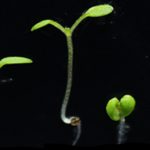Sarah Courbier: Plant Physiology First Author

 Sarah Courbier, first author of “Mechanisms of far-red light-mediated dampening of defense against Botrytis cinerea in tomato leaves”
Sarah Courbier, first author of “Mechanisms of far-red light-mediated dampening of defense against Botrytis cinerea in tomato leaves”
Current Position: Postdoctoral researcher in the Horticulture and Product Physiology (HPP) group at Wageningen University and Research, The Netherlands.
Education: BSc and MSc in plant bioscience from the University of Toulouse III (France), PhD degree from Utrecht University (The Netherlands).
Non-scientific Interests: I enjoy travelling, reading (thrillers and murder mystery novels) and cooking. I also love puzzles, escape games and word games.
Brief bio: Since I started to study plant biology, I have always been drawn to how plants can sense and adapt rapidly to changes in their environment and how to translate this knowledge to create more resilient crops in the future. Last year, I graduated from my PhD that I performed under the guidance of Prof. Ronald Pierik and Prof. Saskia van Wees at Utrecht University. My PhD project took part of a larger consortium aiming to reduce energy use in greenhouse systems by replacing conventional lighting by more efficient and sustainable light-emitting diodes (LEDs). My research focused on how tomato growth and immune responses could be affected by changes in the light environment experienced by the plant. We found that far-red light enrichment, typical signal for neighbour proximity and subsequent competition for light (e.g. in greenhouses where plants are grown very close together) could dampen jasmonic acid-mediated defence responses and elevate sugar levels in tomato leaves leading to increased susceptibility to the fungus. In December 2020, I started as a post-doctoral researcher in the Horticulture and Product Physiology group under the supervision of Prof. Leo Marcelis at Wageningen University and Research. Currently, I investigate the effect of LED lighting, temperature and nutrients on plant growth and nutritional quality of lettuce in indoor vertical farming systems (full LED conditions).



